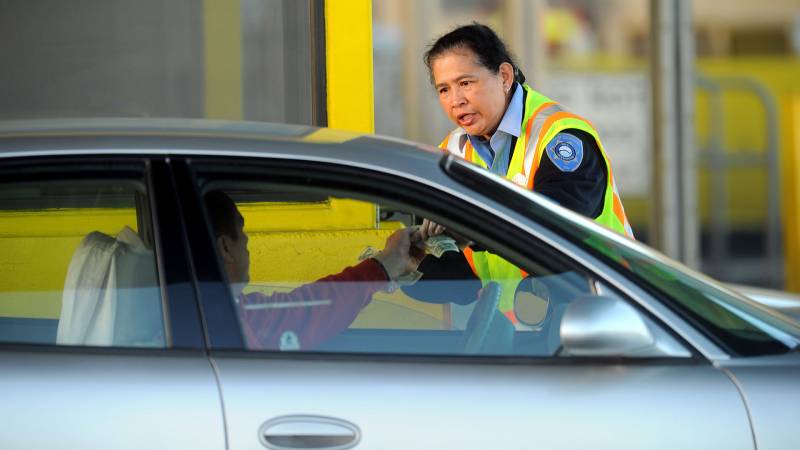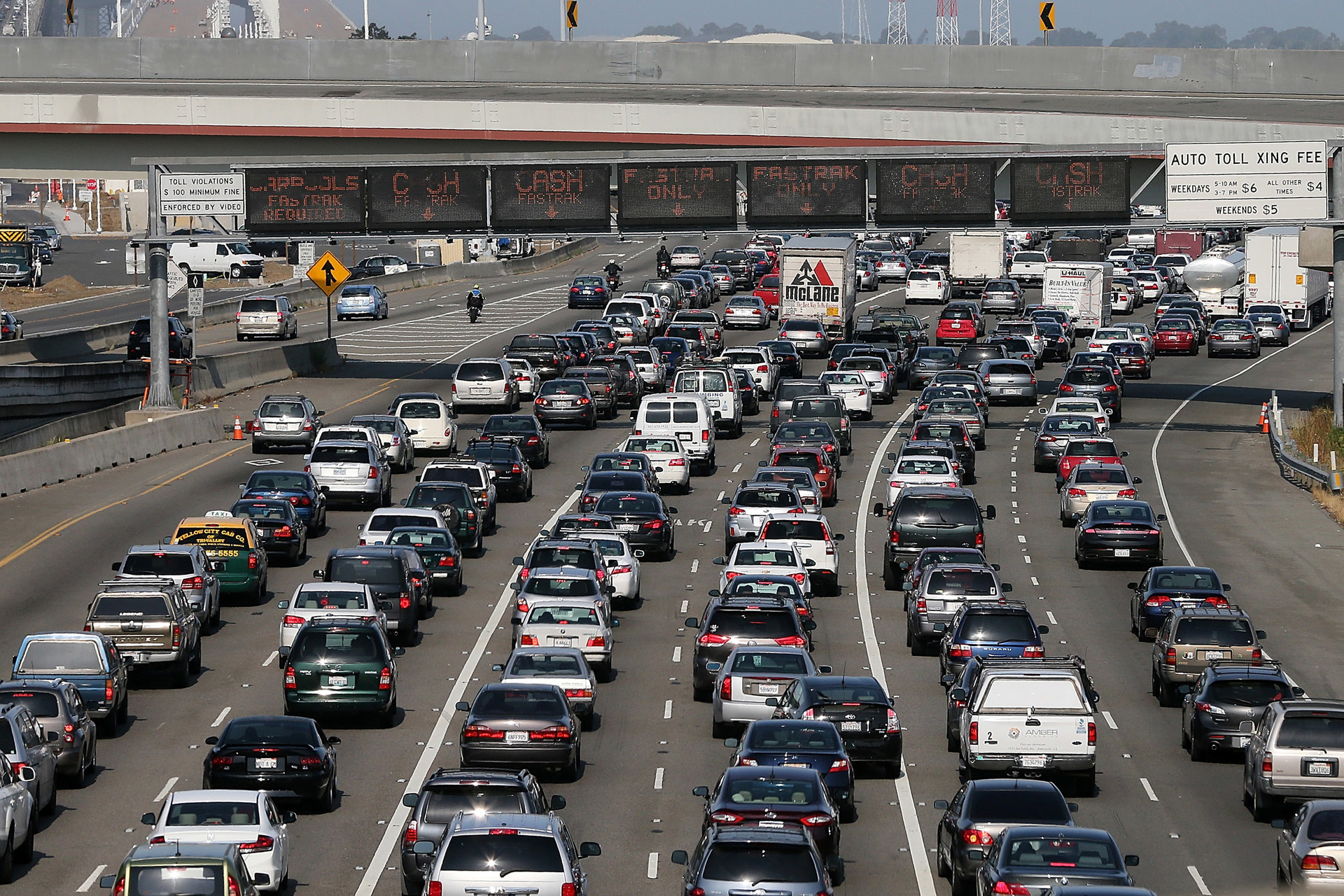Yep Theyre Going to Bridges for One Backup on Toll Booths Again
End of an Era: No More Cost Takers on Bay Area Bridges
Failed to salve commodity
Please try again

A toll worker taking greenbacks from a driver. (Courtesy Bay Expanse Toll Authority)
Bay Curious listener Hoon Kim lives in Alameda and normally commutes by automobile across the Bay Bridge to his piece of work in San Francisco. He, along with 73% of bridge crossers, uses FasTrak, just he's familiar with the last-minute lane trip the light fantastic toe that happens when drivers without the automatic transponder endeavour to get into the correct lane to pay cash.
Kim isn't crossing the bridge as much these days, but he'southward noticed something has changed.
"What happened to all the toll workers?" he wants to know.
Instead of lanes with workers diligently collecting bills, at present at that place are signs telling drivers to drive through without stopping and that they will be billed afterwards. That got Kim wondering even more than.
"How are they billing people? How are they getting in contact with who is the owner of the car? Is that really the right person? And are they actually losing a lot of money?"
What happened to the cost workers?
To answer Kim'southward kickoff question, Gov. Gavin Newsom made the determination to pull toll takers out of their booths when the pandemic hit in March 2020. He saw information technology as an unnecessary risk to their health. That decision sped up a program that transit government take had in place for years to completely eliminate greenbacks tolls and go to an all-electronic tolling organisation.
"Balancing the greenbacks payer with the FasTrak is non an piece of cake affair," said Randy Rentschler, spokesperson for the Bay Area Cost Potency (BATA). "Information technology seems simple, but it's non. And if nosotros have too many cash lanes, it ties up the traffic really badly. If we have too few, and all the greenbacks payers testify upwardly similar they do on the weekends, and you accept FasTrak, you tin't go out of the cash paying mess."

Even subsequently the COVID-19 pandemic is over, at that place will be no more than toll takers on the bridge. It'south the end of an era.
Another listener, Eli Streicker-Hirt, wants to know, what will happen to those workers?
The toll takers piece of work for Caltrans. A spokesperson there says the 250 employees who had been working at Bay Area bridges have not been laid off. Instead, the agency is working with them and their union to detect them other jobs within the agency.
In the long run, going to cashless tolls volition make anybody'southward drive time faster, Rentschler said. He points to the Benicia-Martinez Span as an example of what all Bay Area bridges will eventually be similar — no slowing downwards to go through a toll plaza, just continuing past a sensor at normal speed.
"Some folks were able to make the transition to all cashless easier than others," Rentschler said. "Alter is hard. I think the biggest change is for people who don't utilise the bridges very often."
How are they billing people?
Cameras take a picture of every automobile's license plate equally information technology drives under a sensor at the cost plaza. If the car has a working FasTrak transponder, information technology will beep and deduct the cost. If for some reason the sensor doesn't read the transponder — maybe it's buried deep in the glove compartmnet — then the system will match the license plate to the FasTrak account. If there is no FasTrak associated with the plate, the agency sends a paper bill in the mail to the address listed on the motorcar's registration. Those bills volition come monthly and must exist paid, similar to a utility nib.
Rentschler said that considering this new organization went into result abruptly, BATA did not charge late fees to people who did not pay their bills in 2020. Merely as of January 2021, BATA isn't being and so lenient. If toll bills aren't paid in a timely mode, they're adding on late fees, like cities practise for parking tickets. Rentschler understands that many people practice non pay close attention to their mail, merely said the law requires it.
Are they losing a lot of money?
In 2020, the Toll Potency was losing nigh $four million per month, Rentschler said. That's a lot of coin. But, he called it a "no-involvement loan to the public," because he expects the toll authority will get it dorsum when people go to register their cars and discover they owe fees.
"You tin can't annals your vehicle in California until you pay your toll neb," Rentschler said. "So we're not losing the coin."
The new system raises questions about fairness. Public advocates accept successfully argued that courtroom and probation fees human action like a regressive tax. They can be a logistical stumbling block that trips a person upward, and oft chemical compound. If a person doesn't register their motorcar because they can't pay their toll bill, for example, they might stop up in fifty-fifty more problem for driving an unregistered car.
"For those customers that have accumulated fees, we encourage them to contact u.s. then we can work out an understanding," Rentschler said. "We have worked with many people on the level of the fees and on payment plans. Things happen and we are an understanding organization."
He said the Cost Authorisation thought long and hard nearly those bug, but ultimately decided that the all-electronic transition needed to happen, even if some people never pay. The lien on car registrations is the only mode BATA can discover people who don't keep their address updated with the DMV.
Nosotros're probably going to lose a niggling flake more than," Rentschler said. "Simply everything in life is a trade off. You know, us keeping in functioning 2 full cost collection systems, a greenbacks organization and a FasTrak system, was not cheap."
BATA estimates that 8% of bridge crossers will end upwards in the violation or DMV registration hold category. One affair people often don't know, Rentschler said, is that information technology'south possible to get a prepaid FasTrak transponder that doesn't crave a credit card. They sell them at BATA headquarters in downtown San Francisco and past postal service with a check.
Source: https://www.kqed.org/news/11868435/end-of-an-era-no-more-toll-takers-on-bay-area-bridges
0 Response to "Yep Theyre Going to Bridges for One Backup on Toll Booths Again"
Post a Comment